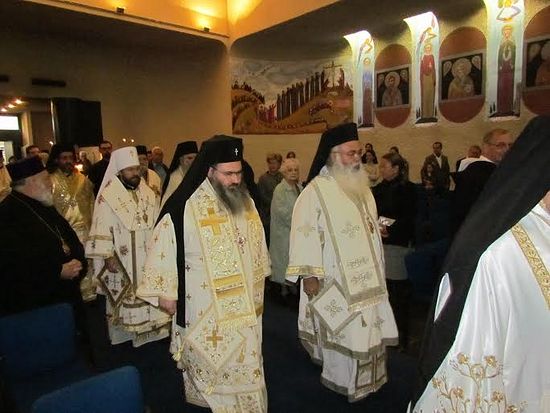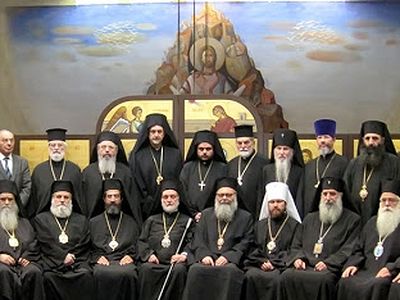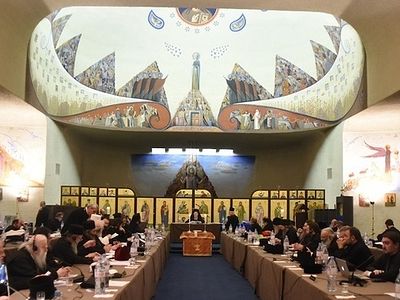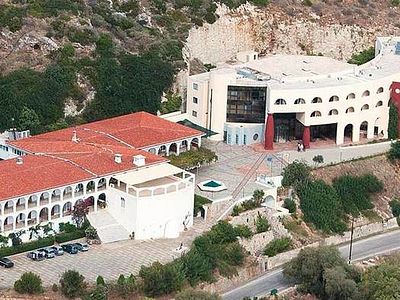Source: DECR Communication Service
January 28, 2016
This document is approved by the participants in the Synaxis of the Primates of Local Orthodox Churches on January 21 – 28, 2016, in Chambesy, excepting representatives of the Patriarchate of Antioch.
It is published by the decision of the Synaxis of the Primates.
Article 1
Introduction
By the grace of the Holy Trinity, the Holy and Great Council is an authentic expression of the canonical tradition and perennial Church practice as to the functioning of the conciliar system in the One Holy, Catholic and Apostolic Church and shall be convoked by His Holiness the Ecumenical Patriarch with the consent of their Beatitudes the Primates of all the universally recognized autocephalous Local Orthodox Churches. It shall consist of members appointed to their delegations.
Article 2
The convocation of the Council
The convocation of a Council shall be announced by Patriarchal letters issued by the Ecumenical Patriarch to all the primates of autocephalous Local Orthodox Churches in which he shall:
1) announce the completion of the pre-council preparation of the items on the Council agenda decided at the pan-Orthodox level;
2) fix the date and venue of the Council with the consent of their Beatitudes primates of all the autocephalous Local Orthodox Churches, and
3) ask the autocephalous Local Orthodox Churches, in conformance with the pan-Orthodox agreements reached at the meetings of their Beatitudes the primates, to appoint their representatives to the Council;
Article 3
Membership of the Council
Members of the Council shall be the hierarchs appointed by each autocephalous Orthodox Church as its representatives:
1) the number of members has been fixed by the meeting of the primates of all the autocephalous Local Orthodox Churches in March 2014 at the Phanar;
2) the delegations may be accompanied by special consultants: clergy, monastics or laity, but their number cannot exceed six persons. Invitations are also given to assistants numbering three from each autocephalous Orthodox Church;
3) Special consultants may attend the Council’s plenary sessions without the right to speak or to vote and they shall assist the Council Secretariat or Council Commissions in their work with the right to speak and exercise special functions assigned to them;
4) During the Council, each primate may have with him one or, if possible, two hierarchs – members of the Church’s delegation. Due to his numerous duties, the Chairman may have two such members and one secretary; all the consultants shall sit behind their primates;
5) If it is impossible for the primate of a particular Local Church to attend the Council or one of its sessions in person, he shall be replaced by another hierarch of his Church, in accordance with its practice.
Article 4
Chairmanship of the Council
The chairmanship of the Council shall be exercised by
1) the Ecumenical Patriarch. The primates of other Local Orthodox Churches shall be placed on his right and left according to the diptychs of the Ecumenical Patriarchate;
2) The members of the Local Orthodox Churches delegations shall sit according to the order of the diptychs in places assigned to them at the Council’s meeting hall, with special consultants of each delegation placed next to them to facilitate cooperation;
Article 5
The powers of the Chairman
The Chairman of the Council shall
1) declare the opening and closing of the work of the Council;
2) work together with the primates of the autocephalous Orthodox Churches to plan the work on the items of the Council’s agenda and to immediately settle any matter of procedure or function of the Council;
3) approve the program of liturgical celebrations to be held during the Council;
4) guide the discussions at each session by making brief remarks depending on the circumstances in order to ensure the greatest consistency of discussions with the tasks of the Council:
5) give the floor to members of the Council and guarantee strict observance and correct application of the principles of the present procedure in order to ensure the good progress and proper ecclesiastical order of the work;
6) coordinate the work of the pan-Orthodox Secretariat of the Council.
Article 6
Secretariat of the Council
The Secretariat of the Council is a pan-Orthodox body, i.e.:
1) it shall consist of one hierarch from each delegation as well as a secretary for the preparation of a Holy and Great Council, who supervises the work of the pan-Orthodox Secretariat:
2) members of the Secretariat shall be assisted in their work by ad hoc advisers: clergy, monastics or laity who are chosen from among the consultants of the delegations of the Local Orthodox Churches and shall support the manifold work of the pan-Orthodox Secretariat. The number of such advisers cannot exceed two persons from each delegation.
Article 7
Terms of Reference of the Secretariat of the
Council
The terms of reference of the Secretariat of the Council shall be as follows:
1) to compile files with materials for the pre-Council progress for drafting texts on items on the Council’s agenda in the official working languages;
2) to take the minutes of the Council’s sessions;
3) to assist in the work of plenary sessions and the Council’s Commissions;
4) to ensure the proper organization of simultaneous translation of the Council’s discussion into the official languages;
5) to set up Special Committees for both drafting reports for immediate information to the public on the progress of the Council and for preparing its message;
6) to properly inform the present observers from other Christian churches or confessions by providing them with appropriate files with items on the Council’s agenda; and
7) to solve immediately all other unforeseen practical or procedural problems.
Article 8
The Work of the Council
The work of the Council shall begin and end with the celebration of the pan-Orthodox Divine Liturgy presided over by the Ecumenical Patriarchate with the participation of all the primates of the autocephalous Orthodox Churches or their representatives in accordance with the diptychs of the Ecumenical Patriarchate;
1) It shall be carried out in the form of plenary sessions and/or Council’s Commissions in accordance with the elaborated program of studies on the agenda items, the texts of which were unanimously approved by the Pan-Orthodox Pre-Council Conferences and Meetings of the Primates of autocephalous Orthodox Churches;
2) there can be no introduction of texts or new issues which were not unanimously approved by the Pan-Orthodox Pre-Council Conferences and Meetings of the Primates, except the Message of the Council. The draft of it will be prepared by a special pan-Orthodox commission a week before the convocation of the Council and will be subject to approval by the primates of the Orthodox Churches;
3) with the exception of the opening and closing sessions of the Council, all other sessions shall be closed.
Article 9
Discussions
1) discussions shall be held in the official languages of the Council, namely, Greek, Russian, French and English as well as Arabic as a working language. Simultaneous translation will be provided;
2) items shall be considered in the order in which they stand on the Council agenda. Discussion shall be strictly restricted to the theme approved for each session;
3) any off-topic intervention shall be forbidden, otherwise the floor shall be taken from the speaker, except for the cases where the intervention is justified and concerns a procedural or personal matter; therefore, in this case he who asks for the floor should indicate which provision of the procedure is breached.
Article 10
Participation of members in discussions
Speaking from the floor at the Council is free, but nobody can speak without asking for and receiving the permission of the Chairman of the Council.
1) a member of the Council who wishes to participate in a discussion on a particular item shall give a written notice to an appropriate member of the Secretariat of the Council who makes a prioritized list for those who wish to speak and presents it to the Chairman of the Council;
2) the duration of an intervention for each speaker cannot exceed ten minutes and in case of a reprise and needed explanations or the Chairman of the Council deems it necessary or useful, it cannot exceed five minutes. The primates of the autocephalous Orthodox Churches shall have twice as much time at their disposal for their interventions;
3) all controversial dialogues and all personal disputes between members of the Council shall be forbidden since such are not only alien but also contrary to the tasks of the Council.
Article 11
Amendments to texts
Formulated during the discussion on each theme, proposals for amendments, corrections and additions to the texts on the Council’s agenda unanimously approved by the Pan-Orthodox Pre-Council Conferences and Meetings of the primates, as well as the text of the Message of the Council
1) shall be submitted by delegations of the Orthodox Churches to the Secretariat for the Chairman to present to a plenary session for ratification by an official decision by the Council;
2) the approval of these amendments after their consideration is completed shall be expressed in accordance with the established pan-Orthodox procedure of consensus of all the autocephalous Orthodox Churches. It means that the amendments which were not approved unanimously shall not be passed.
Article 12
Voting and approval of texts
The voting on the results of a discussion or review of a Council’s text on an agenda item
1) shall be effected by autocephalous Orthodox Churches, not by each particular member of the delegations represented at the Council, in accordance with the unanimous decision of the Meeting of the Primates of Orthodox Churches;
2) the voting of a Church at the Council, not a member of a delegation, does not exclude the possibility for one or a few hierarchs in the delegation of a particular autocephalous Church to take a negative position towards introduced amendments or a text in general. The fact of disagreement shall be registered in the Minutes of the Council;
3) the evaluation of such disagreement is an internal affair of that Church to which the hierarchs belong. The Church may vote from the principle of internal majority expressed by its primate and for this reason it should be accorded the place and time necessary for considering this issue within the delegation.
Article 13
Adoption and signing of texts
The unanimously approved texts on the agenda of the Council shall be produced in the four official languages and shall be equally valid. They
1) shall be signed by the initials of all the primates of the autocephalous Orthodox Churches on each page and in all the official languages of the Council and on the final page by the Chairman and all members of the Council;
2) the Council’s signed decisions as well as the Message of the Holy and Great Council shall be sent out by Patriarchal letters of the Ecumenical Patriarch to the primates of the autocephalous Orthodox Churches who shall bring them to the notice of their Churches. These documents shall have a pan-Orthodox authority.
Article 14
Participation of observers
The observers from other Christian churches or confessions as well inter-Christian organizations shall be present at the opening and closing sessions of the Council without the right to vote or speak.
Article 15
Preparation of Minutes
The Minutes of the work of the Council shall be transcribed and edited in accordance with the established order for publication in the official languages and sent out to all the autocephalous Orthodox Churches by the Pan-Orthodox Protocol Commission of the Council’s Secretariat appointed by the decision of the primates of all the autocephalous Orthodox Churches.
Article 16
Information for the press
1) by the decision of the Chairman and with the consent of the primates of other Orthodox Churches a Council Commission shall be set up consisting of fourteen members of the Council (one from each Church) and to be assisted by special advisers. The commission shall inform the mass media on the progress of the Council on a regular basis;
2) only those journalists who are appropriately accredited in the Secretariat for the Preparation of the Holy and Great Council may be present at the opening and closing sessions of the Council.
Chambésy, 27 January 2016




